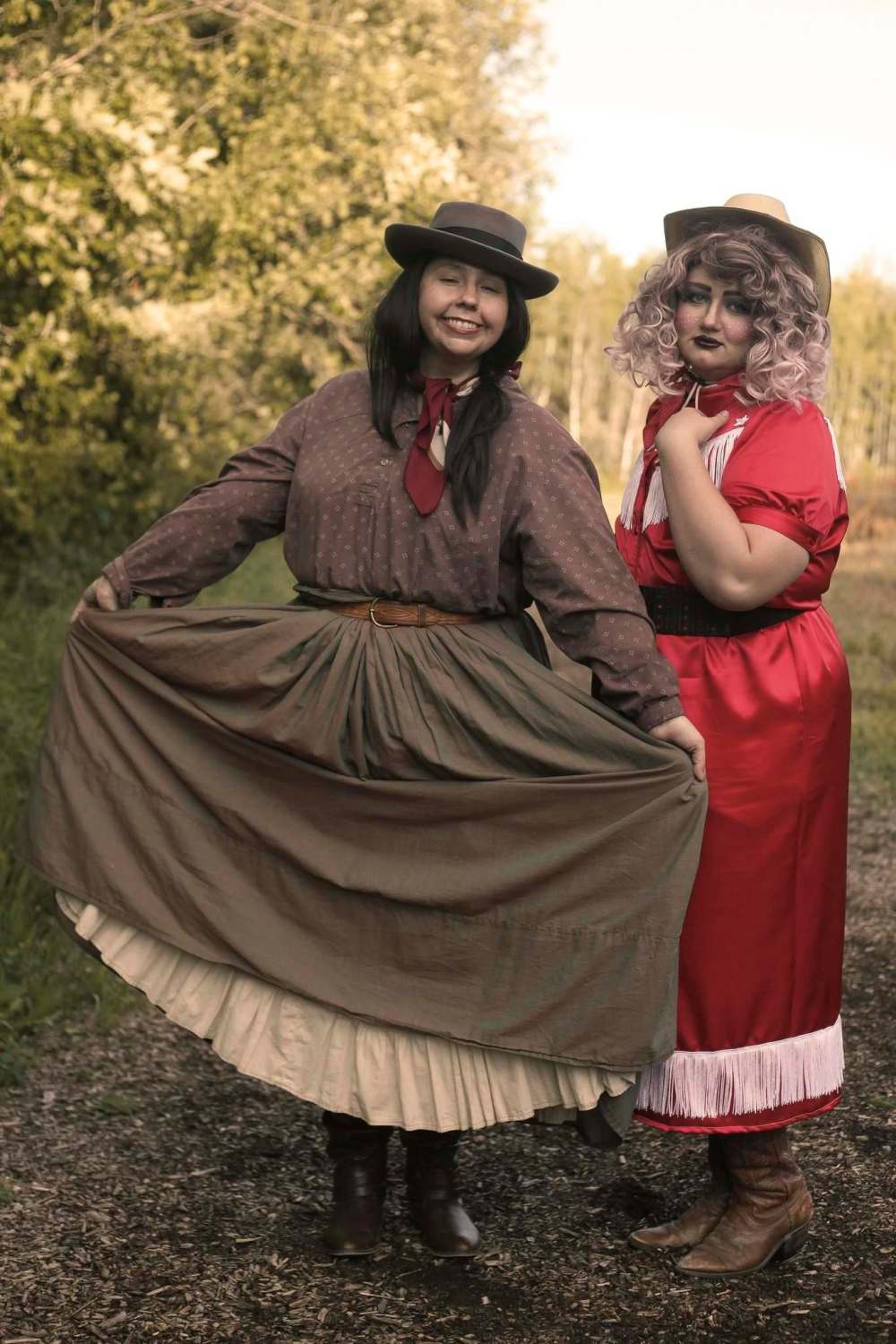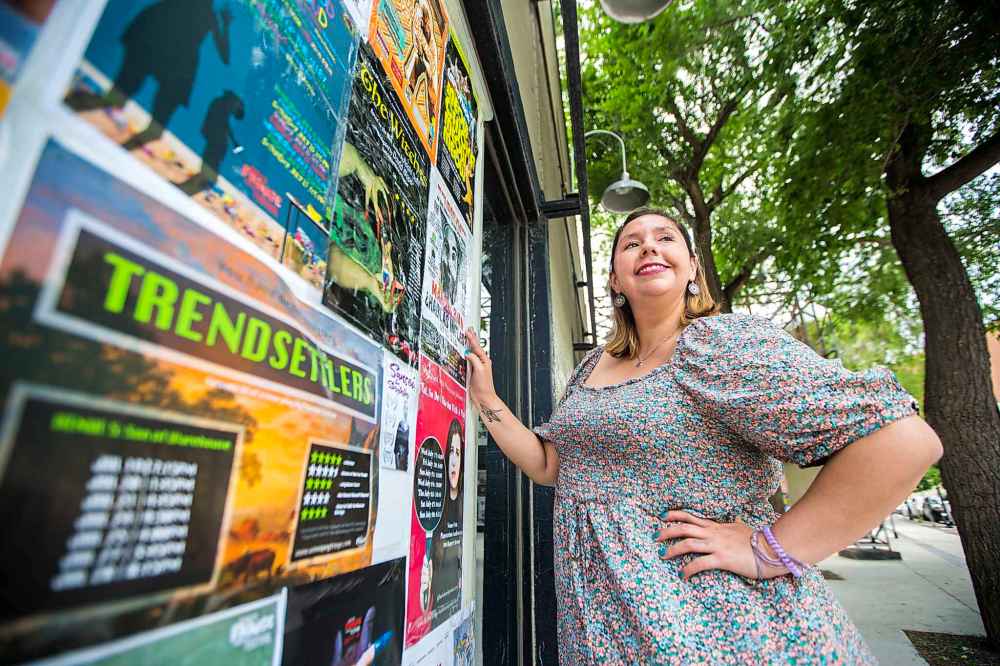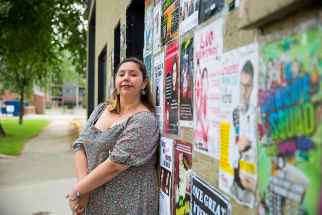The art of writing a play Free Press scribe and Fringe contributor shares the pleasures -- and pains -- of being a playwright
Read this article for free:
or
Already have an account? Log in here »
To continue reading, please subscribe:
Monthly Digital Subscription
$0 for the first 4 weeks*
- Enjoy unlimited reading on winnipegfreepress.com
- Read the E-Edition, our digital replica newspaper
- Access News Break, our award-winning app
- Play interactive puzzles
*No charge for 4 weeks then price increases to the regular rate of $19.00 plus GST every four weeks. Offer available to new and qualified returning subscribers only. Cancel any time.
Monthly Digital Subscription
$4.75/week*
- Enjoy unlimited reading on winnipegfreepress.com
- Read the E-Edition, our digital replica newspaper
- Access News Break, our award-winning app
- Play interactive puzzles
*Billed as $19 plus GST every four weeks. Cancel any time.
To continue reading, please subscribe:
Add Free Press access to your Brandon Sun subscription for only an additional
$1 for the first 4 weeks*
*Your next subscription payment will increase by $1.00 and you will be charged $16.99 plus GST for four weeks. After four weeks, your payment will increase to $23.99 plus GST every four weeks.
Read unlimited articles for free today:
or
Already have an account? Log in here »
Hey there, time traveller!
This article was published 17/07/2019 (2341 days ago), so information in it may no longer be current.
If I knew how to write a play, I probably wouldn’t keep writing plays.
I am a playwright. I write for the stage. It may sound glamorous, but the truth is that playwright is a terrifying process that never seems to get easier and will destroy your soul. Every day I wish I had listened to my parents and gone to law school instead. But every day, I just keep writing plays.
HOW TO MAKE A FRINGE SHOW
1. Enter the Fringe lottery
2. Snag a spot
3. Procrastinate until April
4. Buy a case of redbull and write a play
5. Cast your play and hire your team
6. Rehearse! All day! Every day!
7. Bring snacks to every rehearsal. This is very important.
8. Collapse with exhaustion the day before opening night.
9. Open your show. Have fun.
10. ACHIEVE SUCCESS!
I first started writing at my after-school job at the Royal Manitoba Theatre Centre. I worked in the exciting land of ticket sales and would use my downtime to read scripts. Eventually I started writing some scripts of my own. I would cast my co-workers and friends in roles and make everyone read them at parties. This may go without saying, but I did not get invited to a lot of parties.
I did, however, get invited to the greatest party of all: grad school. Like every writer in every movie ever made, I moved to New York City to fulfil my dreams. I was going to be the next Carrie Bradshaw, the next Arthur Miller and maybe even the next William Shakespeare. I had a long list of people I wanted to be.
Oddly, I never wanted to be myself.
When I finished school and moved back to Winnipeg, I started my career as a playwright. I thought it would be straightforward. I thought it would be simple. Most of all, I thought it would be fast.
That was five years ago. The upcoming production of my play Women of the Fur Trade at the Royal Manitoba Theatre Centre in February 2020 will mark my professional playwriting debut. It’s exciting, don’t get me wrong, but it took five years to get there. While many of my friends are now established in their careers, I feel like I’m just getting started.

Writing a play isn’t easy, and unless you are one of the lucky ones, it takes a long time to break into the industry… but it’s not impossible. I’ve (almost) done it and you can do it, too. And one of the best places to start is at the Winnipeg Fringe Festival.
This summer marks my 12th year of attending the Fringe as an audience member and my seventh participating as an artist. I’ve written, directed, produced, designed, stage-managed and even (begrudgingly) performed in shows.
TRENDSETTLERS, EPISODE IV
Plays the following times at Son of Warehouse (Venue 5):
Friday, July 19, 7:15 p.m.
Saturday, July 20, 1:45 p.m.
Sunday, July 21, 4:45 p.m.
Wednesday, July 24, 9:30 p.m.
Thursday, July 25, 4:30 p.m.
Saturday, July 27, 3:45 p.m.
Sunday, July 28, 8:15 p.m.
This venue is not wheelchair accessible.
Content Warnings: This play contains subject matter exploring the impact of colonization in regards to gender and mental health, including racism, misogyny, homophobia, transphobia, mental illness and suicide ideation. The performance also contains flashing lights.
This year I’m writing and directing part of new work-in-progress play at Venue 5: Son of Warehouse called Trendsettlers, which follows a group of unlikely pioneers on their journey across the Oregon Trail. This part, Episode IV, is about a fabulous drag queen named Lucille (played by Maegan Yallowega) who is travelling the trail in search of a better life in the promised land of Oregon. Our set is a beautiful pioneer wagon designed by Callie Lugosi. We even have a taxidermy fox. If that doesn’t entice you to get tickets, I don’t know what will.
Established, emerging and first-time writers can all find an audience at the Fringe. You get fantastic experience learning what it takes to bring a play to life and get valuable audience feedback that will inform your writing.
In life, we spend a lot of our lives trying to fit in. In theatre, you want your voice to stand out. That means turning inward and discovering what makes you unique. It often means exploring trauma you’ve buried deep inside. It is very difficult work. In my experience, the harder it is, the better the writing.
The Pulitzer Prize-winning playwright August Wilson was German and African-American, but ultimately found his voice by embracing and amplifying African-American culture. “My early attempts writing plays did not use the language that I work in now. I didn’t recognize,” he explains, “the poetry in everyday language of black America. I thought I had to change it to create art.”
When I began writing plays, I wanted to be like everyone else. I wanted to fit in. I wanted to tell stories that were safe, easy and familiar. It wasn’t until I began exploring and embracing the aspects of myself that were unlike what surrounded me that my work started to get noticed. Finding your voice is hard. Staying true to your voice is almost impossible and requires constant maintenance.

In Lucas Hnath’s play A Doll’s House Part II, the main character Norah remarks, “It’s really hard to hear your own voice, and every lie you tell makes your voice harder to hear, and a lot of what we do is lying. Especially when what we want so badly from other people is for them to love us.”
It’s always scary to share your work with other people. In theatre, success is often measured by ticket sales and reviews. I don’t believe it has to be that way. Success can be about having fun. It can be about making a mistake and learning something new. Usually, for me, success is simply writing a word on a page… and then another one, if I’m lucky.
A big lesson I’ve learned recently about theatre is how important it is to have a life outside theatre. After five years of seeing every show, reading every script, writing constantly and schmoozing as much as humanly possible, I found my love of theatre turning in to hate. I was completely burned out.
One of my favourite playwrights of all time, Anton Chekhov, was not only a writer but also a doctor. “Medicine is my lawful wife,” he said, “and literature is my mistress. When I get fed up with one, I spend the night with the other.” He knew the importance of separateness. For him, these two passions that probably seemed mutually exclusive to others were a great source of inspiration.
If you want to be a playwright, find your other passions. Nurture them. When writing fails to bring you joy, which it inevitably will, you need to have those other passions in place to fall back on. I highly recommend your other passion is not wine. It gets expensive and student loans don’t pay off themselves.

In a somewhat surprising turn of events, I’ve recently found myself here at the Winnipeg Free Press reporting on arts and culture. Many people were shocked by that move, especially when it outwardly seemed like I was about to finally make it big in theatre.
I think writing is about creating change. As playwright Tom Stoppard once said, “If you want to change something by Tuesday, theater is no good. Journalism is what does that. But, if you want to just alter the chemistry of the moral matrix, then theater has a longer half-life.”
I’m still finding my voice as a playwright. I probably always will be. And you probably always will be, too. And writing a play for the Winnipeg Fringe Festival is a really, really good place to start.
frances.koncan@freepress.mb.ca
Twitter: @franceskoncan

Frances Koncan (she/her) is a writer, theatre director, and failed musician of mixed Anishinaabe and Slovene descent. Originally from Couchiching First Nation, she is now based in Treaty 1 Territory right here in Winnipeg, Manitoba.
Our newsroom depends on a growing audience of readers to power our journalism. If you are not a paid reader, please consider becoming a subscriber.
Our newsroom depends on its audience of readers to power our journalism. Thank you for your support.









.jpg?h=215)